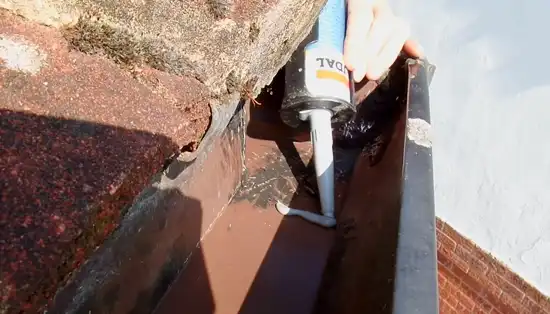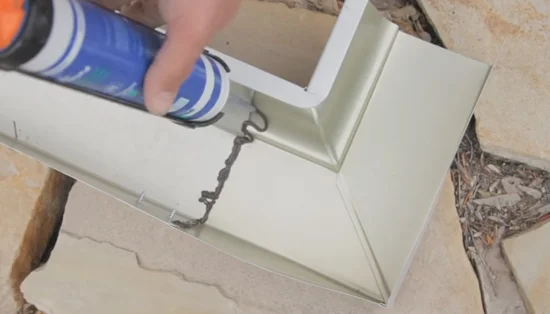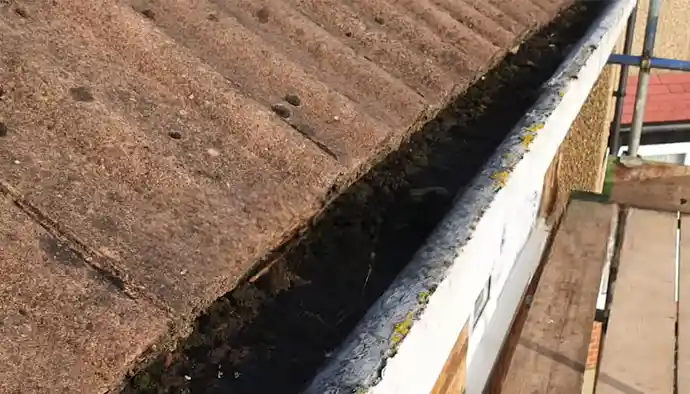Last Updated on January 18, 2023
When it comes to sealing your concrete gutters, there are many options. You can use bitumin or fiberglass, but these solutions are not permanent, and their short lifespan means you have to repeat the process over.
Moreover, they can reduce the overall water capacity of your roofline. This can cause damp problems in your home.
How to Seal Concrete Gutters: 7 Ways
Adiseal
Adiseal is a high-performance multi-purpose adhesive designed to repair and seal concrete gutters. It can be applied to gutters in any condition, including wet ones. In addition, it can be applied while the gutter is wet, which means you can use it right away and get the long-lasting seal you need.
Adiseal bonds all metals to concrete and is suitable for interior and exterior applications. It doesn’t need to be primed and can adhere to stone, brick, tile, and masonry. It doesn’t stain or bleed into the stone or brick. Unlike other adhesives, Adiseal will not wash off or soak into stone, so it won’t cause problems.
Adiseal is waterproof and flexible. Because of its waterproof properties, it can be applied while the gutter is wet. Its high gap filling capabilities enable it to seal large gaps and holes in gutters. It is also UV-resistant, which means that it can resist water damage without cracking or fading.
Gorilla’s waterproof tape
Gorilla Waterproof Patch & Seal Tape is an extra strong adhesive tape that will seal off water, air, and moisture. Made with a UV-resistant backing and extra thick adhesive layer, this tape conforms to any surface and forms a permanent bond indoors or outdoors.
This product is perfect for a wide variety of projects, including home, auto, marine, and outdoor uses.
To apply the waterproof tape, begin by cleaning and preparing the surface to be sealed. The surface must be clean, non-porous, and free of dust or debris.
The tape must also make full contact with the surface to create a seal. It should also be applied so that there are no gaps or wrinkles. Apply enough tape to cover the entire surface area, including the seams.
Gorilla’s adhesive & sealant
Gorilla’s adhesive & sealant is a great way to protect your gutters from water damage. This sealant is UV resistant and has extra thick adhesive to seal out water. It can be applied to a variety of surfaces.
It’s also highly flexible and conforms to its surroundings, forming a permanent bond indoors and outdoors. It’s not recommended to paint over the sealant, as it is a glossy finish that can’t be covered.
Silicone caulk

Silicone caulk is one of the best sealants available for sealing concrete gutters. It can seal joints and cracks between concrete sections. It can also be used to fill cracks in masonry-stucco walls. Most formulas are polyurethane based, but some contain sand to create a masonry-like texture.
The main downside of silicone caulk is that it is not waterproof, and if you want to paint your concrete gutters, silicone is not a good option. Once the silicone has cured, it can’t be painted. Once the silicone has dried, you will need to remove it and apply new caulk.
This sealant is non-toxic and animal-safe. It won’t harm curious birds or animals. It has an attractive glossy finish and can be applied in various ways. Silicone caulk is a great choice if you want to protect your concrete gutters.
It won’t harm curious birds or damage the exterior of your house. It also doesn’t need to be cured to apply to other surfaces, making it great for many different applications.
Cheap silicone caulks
When it comes to caulking jobs, silicone caulk is one of the best choices because it’s resistant to a wide range of substances. It can be used for both interior and exterior projects.
It’s also easy to apply and clean up. However, you should always make sure that you choose the right color and that the area is dry before you begin the caulking process.
There are a few factors to consider before choosing a sealant, including temperature, humidity, and wind. The type of sealant you choose will also affect the drying time. Some sealants are water-based and some are solvent-based.
Solvent-based products require strong solvents to remove them, so you may want to consider a silicone-based product. Another option is a hybrid formula, which combines silicone and polyurethane.
For more expensive projects, you can consider tri-polymer caulk. Tri-polymer caulk has the same benefits of silicone caulk, but will not shrink as it dries. It is also suitable for PVC and aluminum gutters, and is a great choice for contractors. However, it does cost more than butyl rubber caulks.
Rubber caulks
Rubber caulks are a popular choice for sealing concrete gutters and downspouts. These caulks can be applied using brushes or a caulking gun. The caulking gun can be very convenient, because it allows you to inject the sealant into the gaps and cracks with minimal waste.
One type of rubber caulk is DAP 18377, a clear, gel-type caulk that dries in about 30 minutes and can be painted to match the rest of the home. The material withstands temperatures of 20 degrees Fahrenheit to 120 degrees Fahrenheit, but there is no information on its UV resistance.
Butyl caulk is another choice, and it can be used to seal joints on a roof, outdoor foundation, or even aluminum siding. Before applying it, ensure that the surface is clean and free of loose materials.
You may want to use a wire brush to remove any loose debris before caulk application. The surface should be at least 40 degrees Fahrenheit for the caulk to properly seal the joints.
Vinyl caulks
Using a high-performance sealant like Geocel Pro(tm) is an excellent way to protect your concrete gutters from damage. The polymer-based sealant is easy to apply and has a high degree of resistance to both water and weather. It also remains flexible and strong in outdoor conditions.
There are different types of vinyl caulks. Some are water-based, while others are solvent-based. If you’re not sure what to use, silicone-based caulks are a good choice. These products have a low odor and cure quickly, making them a good choice for sealing gutters.
Butyl-rubber caulks are ideal for outdoor projects because they can withstand extreme temperatures. They also form a strong seal and are waterproof. While they’re a good option for sealing concrete gutters, they can be a bit tricky to clean up.
Vinyl caulks can be white, clear, or colored. White caulk blends with most surfaces, while clear caulk is less visible. Sanded caulk, on the other hand, has small particles to help it adhere to wet surfaces.
It also expands to fill larger gaps without cracking. Sanded caulk is best used in joints that are an eighth of an inch or wider.
Is there anything else that needs to be done in order to maintain the gutters after sealing them?
Keep the area around your gutters clean
One of the best things you can do to prolong the life of your gutters is to keep the area around them clean. This means removing any debris such as leaves, twigs, and acorns on a regular basis. Doing so will prevent clogs and ensure that water can flow freely through your gutters.
Inspect your gutters regularly
Even if you keep the area around your gutters clean, it’s still a good idea to inspect them periodically for any problems. Look for cracks, leaks, or rust spots and address them immediately. Ignoring these issues can cause serious damage to your gutters and even your home.
Have your gutters cleaned professionally once a year
Even if you do a great job of keeping your gutters clean, there’s always a chance that something will get missed. That’s why it’s a good idea to have them cleaned by a professional at least once a year. This will remove any built-up debris and give you peace of mind that your gutters are in good condition.
Have you ever encountered any problems while trying to seal concrete gutters?

Yes, I have encountered several problems while trying to seal concrete gutters. The main issue that I have faced is the inconsistent quality of the sealant products on the market.
In addition, it can be difficult to get a good seal around all of the edges of the gutter, which can lead to leaks. Another problem that I have encountered is cracking or chipping of the concrete gutter surface after application of the sealant.
How much does it cost to seal concrete gutters?
It depends on the size of the gutters, but typically it costs between $8 and $12 per linear foot.
Sealing concrete gutters can help to prevent water damage, which can save you money in the long run. Sealing also makes it easier to clean the gutters, and it can help to protect them from staining and fading.
Is it necessary to seal concrete gutters?
Yes, it is necessary to seal concrete gutters to prevent water from seeping through the cracks and causing damage to the foundation of the building.
Concrete gutters are often porous, which means that they can easily absorb water. If left unsealed, this water can slowly seep into the foundation of the building and cause extensive damage. Sealing concrete gutters is a quick and easy process that can help protect your home or office from costly damage.



